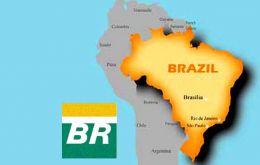MercoPress. South Atlantic News Agency
Stories for January 2009
-
Wednesday, January 14th 2009 - 20:00 UTC
Rio Tinto “delays” massive iron ore port project in Uruguay

Anglo-Australian mining giant Rio Tinto has decided to halt a project planned for western Uruguay for at least one year due to the global financial crisis, the Uruguayan government admitted this week.
-
Wednesday, January 14th 2009 - 20:00 UTC
Brazil exported 620.000 bpd of crude last December

Brazilian state oil company Petrobras exported in December an average of 620,000 barrels of crude per day, establishing a new record.
-
Wednesday, January 14th 2009 - 20:00 UTC
Uruguay: 6 companies interested in possible offshore oil & gas

Six companies to date have purchased data packages for Uruguay's first offshore Exploration and Production round, mining and energy minister Daniel Martínez said after making a presentation at an energy conference in Santiago de Chile.
-
Tuesday, January 13th 2009 - 20:00 UTC
Lula da Silva warns Brazilians of “tough” first quarter
Brazilian president Lula da Silva warned of a “worrisome and tough” first quarter but promised the government is prepared to inject more resources to the economy to help combat the effects of the global crisis and stimulate activity.
-
Tuesday, January 13th 2009 - 20:00 UTC
Uruguay: emergency aid for drought striken farmers
Uruguay declared on Monday an “agriculture emergency” and announced measures to help farmers address the very serious “rain deficit” which is threatening crops, livestock and the provision of fresh produce. The package includes importing fodder and cow feed for dairy farms as well as postponing tax and social security payments, and energy bills.
-
Tuesday, January 13th 2009 - 20:00 UTC
Court approves UK's “super bank”: Lloyds TSB + HBOS
The formation of a UK “super bank” has been rubber-stamped with a court giving its approval for Lloyds TSB's takeover of HBOS. The Court of Session in Edinburgh gave the green light to the deal after a legal hearing lasting all day.
-
Tuesday, January 13th 2009 - 20:00 UTC
IMF needs another 150 billion to aid emerging markets
The International Monetary Funds may need up to 150 billion US dollars in additional funds to assist emerging markets and poorer countries suffering through the intensifying global economic slump, IMF Managing Director Dominique Strauss-Kahn said.
-
Tuesday, January 13th 2009 - 20:00 UTC
Mrs. Kirchner back to business on a light, private agenda

Contrary to Buenos Aires press speculation and apparently to medical counselling, Argentina's President Cristina Fernandez de Kirchner retook on Monday afternoon her agenda at the official residence of Olivos, although at a lighter pace and with breaks for short walks in the gardens.
-
Tuesday, January 13th 2009 - 20:00 UTC
Wildlife in Falklands Scotland School linking program

Education officers from Edinburgh Zoo have headed to the Falkland Islands to teach local children about Scottish wildlife, according to a report from the News Scotsman.
-
Tuesday, January 13th 2009 - 20:00 UTC
Boiling kettles, Google search and carbon dioxide

Two search requests on the internet website Google produce “as much carbon dioxide as boiling a kettle”, according to a Harvard University academic. US physicist Alex Wissner-Gross claims that a typical Google search on a desktop computer produces about 7g CO2.
